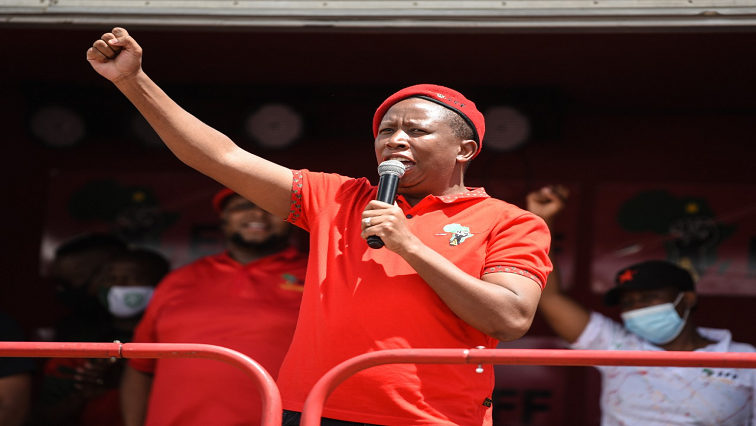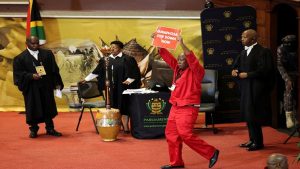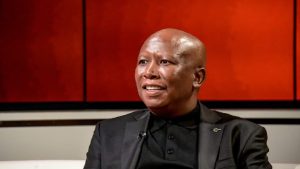Proponents of democracy, believing in the central claim that strong opposition parties lead to a strong and healthy democracy, might see the expulsion of Julius Malema from the African National Congress and Cyril Ramaphosa’s subsequent rejection of his appeal at the ANC’s 53rd Elective Congress in Mangaung in 2012 as a blessing in disguise.
On July 26, 2013 – the anniversary of the July 26 Movement that sparked the Cuban revolution – Malema and other disgruntled ANC Youth League leaders went on to establish the Economic Freedom Fighters.
While many believed that the red berets didn’t have what it takes to establish themselves as a key role-player in South African politics, positing that the hype around the party’s formation will eventually wear off and disperse, the fighters replaced the Congress of the People (COPE) – another ANC breakaway – as the third biggest party in South Africa.
And unlike COPE, who had a strong showing at their first elections only to shrink almost to non-existent in the next, they increased their National Assembly seats from 25 in the 2014 general elections to 40 in 2019; playing a key role in a number of metros, effectively the face of land expropriation and dubbed the voice of the downtrodden. The party has established itself as a radical leftist organisation and has been uncompromising in their dedication to the struggle of Black people and confronting racism.
There’s no denying that the last eight years have been a success for the EFF and the party has shaken the political landscape of the country. As I was watching Julius Malema deliver the party’s keynote address on the occasion of their 8th anniversary, along the lines, he said: “I can sleep at night knowing very well that I have empowered Black Africans with the weapon (EFF) that they will use…” And because of that, the EFF’s biggest challenge, I believe, is sustainability – through combating politics of personality cult to ensure that the party does not suffer the same fate as the Inkatha Freedom Party, United Democratic Movement, National Freedom Party, and COPE.
What all these parties have in common is that their leaders became bigger than the party – placing a firm grip and creating an environment where it has been very hard for leaders of these parties to recognise that anyone else could have any equivalent right to lead the parties, conferring a virtually permanent claim to the throne.
Prince Mangosuthu Buthelezi’s IFP did fairly well. At some point, the party was governing the KwaZulu-Natal province, Bantu Holomisa’s UDM was the official opposition in the Eastern Cape and the NFP – a breakaway of the IFP for reasons I’ve cited above, started off well in 2014 but health issues of the leader, Zanele KaMagwaza-Msibi affected the party’s administration to an extent that it failed to contest the 2016 local government elections in addition to having parallel conferences
That is the challenge of the EFF. Julius Malema is currently into his second term as party leader and will probably vie for a third as the party’s constitution does not prohibit it – members of the party love him, the CIC as he is affectionately called. His larger than life personality, however, poses a threat to the longevity of the party. It is easy for Malema to assume that the popular support derived from party members and supporters conveys a permanent and unconditional attachment to party power.
It is the contention of this article that in order for the party to safeguard its sustainability, Julius Malema must consider handing over the reins to Floyd Shivambu, his deputy of the last eight years at the next People’s Assembly – their Elective Conference. Malema should, however, remain an active member of the party.
Creating an environment where party members, supporters and general South Africans believe not in Julius Malema but the EFF and its ideologies is important. Julius Malema being the leader for too long will stifle the party that has the potential to grow beyond what it already is.
That’s what sets the ANC and Democratic Alliance from the rest of the pack: internal democracy, dissenting views, contestations, debates. Cyril Ramaphosa can never lay claim to the ANC, neither can John Steenhuisen on the DA. The ANC and the DA will be there long after their respective leaders have left office. Can we say the same about the EFF? That’s the trick question.
“Even if I die or go to prison, other [EFF] leaders will lead you,” said Julius Malema addressing party supporters at the party’s manifesto launch for the 2014 General Elections. Six years ago, that would’ve been seen as another firebrand Juju statement. Today, however, it seems as though other leaders will actually lead when he dies or go to prison.
During an interview with Al Jazeera in 2016 he said: “I am not in this thing for myself” on whether he has ambitions of being President one day. But it’s difficult to believe that considering that he can’t differentiate between himself and the party – it seems to be a personal affair of some kind and clouds any democratic processes, if any.
For now, I’ll join millions of South Africans in extending congratulatory messages to the Fighters on 8 years of existence. – Authored by Vusi Gumbi, a Masters candidate in Politics at the University of Johannesburg and the winner of One Day Leader Season 8.






